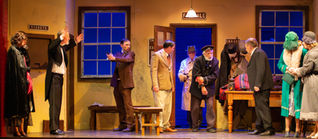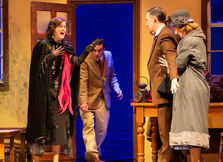The Ghost Train (Revised)
Six passengers find themselves stranded late at night in the waiting-room of an isolated Cornish railway station. Ignoring the ghostly tales and dire warnings of the stationmaster, they decide to stay where they are until morning – with terrifying consequences. Finally, all is revealed and the details of a fiendish plot are laid bare. Arnold Ridley, best known as Private Godfrey in Dad's Army, wrote this much loved and often performed play in 1923.
Dates:
15 - 17th May 2025
Author:
Arnold Ridley
Director:
Toni Conyers
Gallery

Review
It was a pleasure to have returned to visit Parish Players for their Spring 2025 production. Thanks to Richard Warner for the warm welcome and the enjoyable chat upon my arrival.
The Ghost Train is a three-act play written by Arnold Ridley (known for his role as Private Godfrey in Dad’s Army). The action takes place in the waiting room of Fal Vale, a wayside station on the South Cornwall Railway. A group of mismatched passengers find themselves stranded in a dark and isolated station, having missed the last connection of the night. Tales of superstition prevail as the local stationmaster, unable to persuade the passengers to leave, reveals that on this night, twenty years ago, a train crashed, leaving a number of passengers dead. Legend has it that the station is still haunted by the train reliving its final moments as it roars through the station to its demise.
Upon entering the hall, the audience was greeted with a view of the waiting room at Fal Vale station. The detail was quite excellent, and the set truly reminded me of an old-fashioned, very run-down waiting room I was sometimes forced (when it was raining) to sit in as a schoolboy. A door backstage centre opened onto the platform, and a second door stage right led into the ticket office, which was also used as the conductor’s room. There was a lovely working hatch for ticket sales, also stage right, and the set was complete with a fireplace that glowed when lit, waiting-room-style benches, and a table and chairs. There was plenty of space onstage for the actors to move around quite naturally. The staging worked very well, with no blocking—credit to the cast and direction.
As the auditorium lights dimmed, the audience was instantly immersed in the arrival of an old steam engine, various passengers disembarking, and the train departing. Smoke, strobe lighting, the sound of an old steam whistle, squeaking brakes, and the train pulling away instantly set the scene. Simply a wonderful way to open the action!
Toni Conyers should be incredibly proud, given all the time, effort, and lost sleep that must have gone into this production. Even though it is at heart a thriller, The Ghost Train is laced with humour that demands an extremely capable cast if it’s to be performed well. The selection here certainly didn’t disappoint. The single set was well thought-out and uncluttered, resulting in no scene changes to delay the action. All characters were realistic and believable. This was a hugely entertaining and thoroughly absorbing piece of theatre that quickly drew the audience in and fully warrants recognition.
Roger Birtles (Producer) must also have committed a huge amount of time and effort to this production. It must have been pleasing to see all that hard work come together so well.
David Brown set the tone extremely well as Saul Hodgkin, the old stationmaster at Fal Vale. David’s rambling storytelling was so heartfelt that the passengers began believing in the legend of The Ghost Train. With a consistent and strong Cornish accent, along with shuffling physical movement, there wasn’t a hint that he was hiding a secret motive…
Kingsley Hamilton filled the stage with overbearing foolishness as the hugely irritating Teddie Deakin. Through sheer stupidity, Teddie was the cause of the missed connection, but failed to see—or understand—why the other passengers were angry with him. Kingsley brought a great deal of humour to the stage, and his habit of regaling everyone with pointless stories in the most awkward situations was priceless. The final revelation that he was actually a member of the police tracking an arms-smuggling gang was as much a surprise to the passengers as it was to the audience.
Ben Miles and Emily Smith played the roles of newlyweds Charles and Peggy Murdock well, with their characters supporting each other as terrible things began to occur. Obviously upset that their wedding night had been ruined, and that they would be forced to stay in such an awful place, Ben and Emily made for a lovely couple.
Paul Mannix and Caroline Chick, as Richard and Elsie Winthrop, convincingly portrayed the married couple intent on separating. They had a chemistry that represented how much they once loved each other—yet could no longer stand one another. Paul brought out Richard’s controlling side, while Caroline ensured Elsie’s feminist attitude was clearly felt.
Caryl Court was most amusing as Miss Bourne, a highly-strung and definitely starchy old spinster. Caryl showed great comedic skills, and the accidental transition to becoming drunk was very well portrayed. Before being helped to a makeshift bed—and promptly passing out—her declaration that she was “not neglected in my youth!” was hilarious.
Phoebe Spragg was very convincing as Julia Price and certainly put everyone ‘off the scent’ when she first appeared onstage. This troubled young Cornish lady quickly gained the sympathy of the other passengers, who believed she was haunted by her memory of The Ghost Train. Her shocking switch to a wide-eyed, barking mad and hardened criminal was equally convincing.
Mike Tweedale portrayed his character convincingly, with the audience truly believing that he was a real doctor and that Julia was indeed his patient. Mike Norman-Smith completed the cast line-up with a cameo performance as Jackson, the police sidekick.
Ingrid Holtz (Stage Manager) once again ensured things behind the set ran smoothly, with no unwanted delays or distractions. John Wood created a Set Design that was truly authentic and highly detailed for the cast and audience alike. Franand Connie Baxter sourced an excellent collection of costumes that greatly added to the authenticity and overall impression. Ingrid Holtz and Chloe Hopkins did likewise with props, which were both authentic and well-handled by the cast.
Andy Wood and Nick Vaughan-Barratt (Lighting Design), Dave Clifton (Lighting Assistant), and Duncan Hay (Lighting Operator) are to be congratulated for the special effects and lighting, which really made this production stand out. Likewise, Nick Roberts (Sound Design), Kitty Quinn, and David Reeves (Sound Operation) brought the action to life with some excellent sound cues.
Congratulations once again to everyone at Parish Players and all those directly involved with The Ghost Train. This was an excellent production, and I look forward to visiting again in 2026 for Dick Whittington!
Des Wilby
Regional Representative
NODA London District 5

























